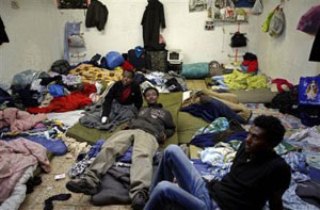Opposition calls for release of Eritreans from Yemeni prison
By Tesfa-Alem Tekle
May 9, 2012 (ADDIS ABABA) – Exiled Eritrean opposition group, the Red Sea Afar Democratic Organization (RSADO) on Wednesday alleged that hundreds of Eritrean refugees who fled to Yemen due to political oppression by the regime in Asmara are being kept in Yemeni prisons, where they are being deprived of their rights.

In March 2011, four groups of Eritrean Navy conscripts fled with their boats to Yemen. However, they were immediately detained by Yemeni authorities and risk being returned to Eritrea since then.
Yasin said the refugees are currently facing communicable diseases which are threatening their lives and are receiving no medical treatment.
The group appealed to the international community to intervene and save the Afar refugees.
It further called on Yemeni authorities to immediately release the refugees and house them in refugee camps.
On a daily basis hundreds of Eritreans risk their lives trying to cross the tightly patrolled Eritrean borders to neighbouring Sudan and Ethiopia, as well as Yemen. There is reportedly a shoot-to-kill policy implemented on the border by Eritrean authorities.
Those who manage to flee the country, if deported by their country of destination could face a possible death, torture or lengthy prison terms upon return.
RSADO called on the Yemeni government to respect the obligations of the Geneva Convention and not to send the refugees back to Eritrea.
Currently tens of thousands of Eritrean civilians, government opponents and journalists are languishing in Eritrean prisons without charge.
Eritrea was recently voted the world’s worst in terms of press freedom by Committee to Protect Journalists; a clear picture of what is happening in Eritrea is therefore difficult to construct.
Human Rights Watch has termed the secretive Red Sea nation a “giant prison”.
Eritrea gained independence from Ethiopia in 1993 but has never had national elections, despite the outcry of exiled Eritreans and pressure by the international community.
The current government led by Issayas Afeworki does not allow opposition political parties to function and the country remains a single-party state since independence.
The Eritrean president appeared on state television last week after he an absence which prompted rumours of his death. Opposition groups maintain that he is seriously ill.
(ST)
